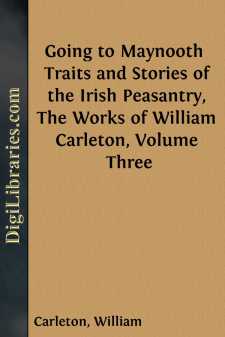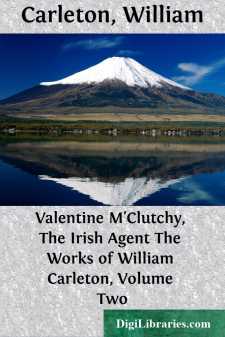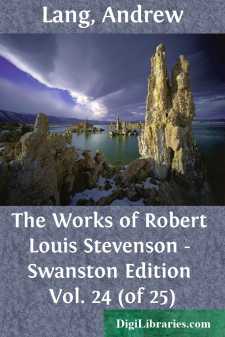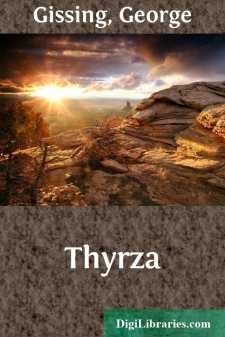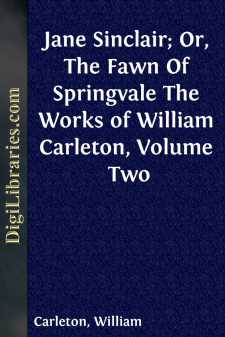Literary Collections
- American 84
- Ancient, Classical & Medieval 14
- Asian 1
- Australian & Oceanian 1
- Canadian 55
- Continental European 121
- English, Irish, Scottish, Welsh
- Essays 160
- General 24
- Letters 46
- Middle Eastern 1
English, Irish, Scottish, Welsh Books
Sort by:
by:
William Carleton
GOING TO MAYNOOTH. Young Denis O'Shaughnessy was old Denis's son; and old Denis, like many great men before him, was the son of his father and mother in particular, and a long line of respectable ancestors in general. He was, moreover, a great historian, a perplexing controversialist, deeply read in Dr. Gallagher and Pastorini, and equally profound in the history of Harry the Eighth, and...
more...
by:
William Carleton
CHAPTER I.—An Irish Pair and Spoileen Tent —A Marriage Proposal—An Under Agent—An Old Irish Squire and Union Lord. The town of Castle Cumber it is not our intention to describe at more length than simply to say, that it consists of two long streets, intersecting each other, and two or three lanes of cabins—many of them mud ones—that stretch out of it on each side at right angles. This...
more...
by:
Andrew Lang
VII October 1882—August 1884 In the two years and odd months since his return from California, Stevenson had made no solid gain of health. His winters, and especially his second winter, at Davos had seemed to do him much temporary good; but during the summers in Scotland he had lost as much as he had gained, or more. Loving the Mediterranean shores of France from of old, he now made up his mind to...
more...
by:
Emily Hickey
The beginnings of Literature in England. Two poets of the best period of our old poetry, Caedmon and Cynewulf. The language they wrote in. The monastery at Whitby. The story of Caedmon's gift of song.How many of us I wonder, realise in anything like its full extent the beauty and the glory of our Catholic heritage. Do we think how the Great Mother, the keeper of truth, the guardian of beauty, the...
more...
by:
George Gissing
AMONG THE HILLS There were three at the breakfast-table—Mr. Newthorpe, his daughter Annabel, and their visitor (Annabel's Cousin), Miss Paula Tyrrell. It was a small, low, soberly-furnished room, the walls covered with carelessly-hung etchings and water-colours, and with photographs which were doubtless mementoes of travel; dwarf bookcases held overflowings from the library; volumes in disorder,...
more...
INTRODUCTION THE KINDS OF CRITICISM It is probably unnecessary, and might possibly be impertinent, to renew here at any length the old debate between reviewers as reviewers, and reviewers as authors—the debate whether the reissue of work contributed to periodicals is desirable or not. The plea that half the best prose literature of this century would be inaccessible if the practice had been...
more...
by:
William Carleton
THE STATION. Our readers are to suppose the Reverend Philemy M'Guirk, parish priest of Tir-neer, to be standing upon the altar of the chapel, facing the congregation, after having gone through the canon of the Mass; and having nothing more of the service to perform, than the usual prayers with which he closes the ceremony. "Take notice, that the Stations for the following week will be held as...
more...
by:
Charles Dickens
CHAPTER I—THE ISLAND OF SILVER-STORE It was in the year of our Lord one thousand seven hundred and forty-four, that I, Gill Davis to command, His Mark, having then the honour to be a private in the Royal Marines, stood a-leaning over the bulwarks of the armed sloop Christopher Columbus, in the South American waters off the Mosquito shore. My lady remarks to me, before I go any further, that there is...
more...
by:
Charles Reade
CHAPTER I. Hillsborough and its outlying suburbs make bricks by the million, spin and weave both wool and cotton, forge in steel from the finest needle up to a ship's armor, and so add considerably to the kingdom's wealth. But industry so vast, working by steam on a limited space, has been fatal to beauty: Hillsborough, though built on one of the loveliest sites in England, is perhaps the...
more...
by:
William Carleton
PART I. If there be one object in life that stirs the current of human feeling more sadly than another, it is a young and lovely woman, whose intellect has been blighted by the treachery of him on whose heart, as on a shrine, she offered up the incense of her first affection. Such a being not only draws around her our tenderest and most delicate sympathies, but fills us with that mournful impression of...
more...


